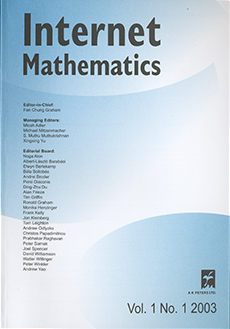Abstract
We anticipate that future web search techniques will exploit changes in web structure and content. As a first step in this direction, we examine the problem of integrating observed changes in link structure into static hyperlink-based ranking computations
We present a very efficient algorithm to incrementally compute good approximations to Google's PageRank [Brin and Page 98], as links evolve. Our experiments reveal that this algorithm is both fast and yields excellent approximations to PageRank, even in light of large changes to the link structure
Our algorithm derives intuition and partial justification from a rigorous sensitivity analysis of Markov chains. Consider a regular Markov chain with stationary probability $\pi$, and suppose the transition probability into a state $j$ is increased. We prove that this can only cause
$\pi_j$ to incease---adding a link to a site can only cause the stationary probability of the target site to increase;
the rank of $j$ to improve---if the states are ordered according to their stationary probabilities, then adding a link to a site can only cause the rank of the target site to improve.
This analysis formalizes why the intuition that drives Google never fails.
Citation
Steve Chien. Cynthia Dwork. Ravi Kumar. Daniel R. Simon. D. Sivakumar. "Link Evolutions: Analysis and Algorithms." Internet Math. 1 (3) 277 - 304, 2003/2004.
Information




